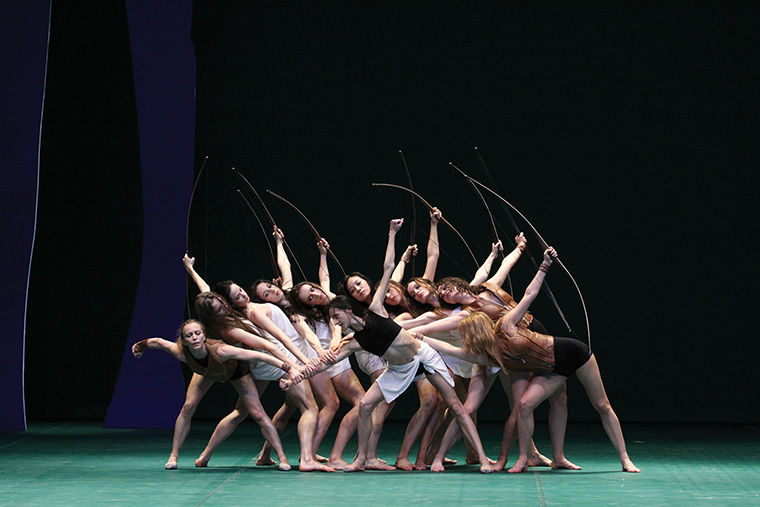Risque Ballet: ‘Sylvia’ at the Joffrey Ballet
The title character Sylvia is one in a group of amazon huntresses led by goddess Diana.
October 12, 2015
Following its show “Millennials,” Chicago’s Joffrey Ballet, located at 10 E. Randolph St., is preparing for the North American premiere of John Neumeier’s “Sylvia.”
The show, which runs Oct. 14–25, is a coming-of-age ballet about a young woman “struggling to find balance between strength and vulnerability and discovering love only through the awakening of her own sensuality,” according to the Joffrey website.
Rory Hohenstein, a lead dancer with Joffrey, said “Sylvia” is a complicated story told through Greek mythology.
“It’s about a woman, Sylvia, who basically is a huntress,” Hohenstein said. “Her leader is the goddess, Diana. A human man comes into the sacred ground and sort of stumbles upon these women and falls in love with Sylvia, and she doesn’t really know what to do with him.”
Hohenstein added that his character, Eros, disguises himself as different characters, like Cupid and Orion, throughout the ballet in order to observe and guide Sylvia on her path to sensual awakening and spiritual maturity.
“Diana gets angry with Sylvia because
she isn’t supposed to fall in love with men, and my character, Eros, disguises himself as a shepherd,” Hohenstein said. “[He] shows Sylvia love, sensuality and sexuality.”
The show departs from classical ballet in both content and aesthetic and could be an entry point for non-ballet fans into the genre, according to Hohenstein.
“It’s not a story that is often told,” Hohenstein said. “It’s not about the woman being saved. She’s a very strong woman…. It’s not your normal drapes hanging, girls in tutus [show].”
Hohenstein added the production based on the 1876 ballet is a fresh perspective of an old story.
The music, composed by Leo Delibes, has a quality of modernity and freshness, said Scott Speck, music director for the Joffrey and conductor for the Chicago Philharmonic orchestra, which accompanies the Joffrey’s performances.
Nestled in the middle of a changing era in music, Delibes’ composition was a sort of transitional piece between Romantic orchestrations and the Impressionist movement, Speck said.
Unlike typical ballet orchestration, where the music takes a backseat to the dancing, Speck said the music in this piece is in the forefront, driving the action of the story forward.
“[Delibes] was really great at telling a story with music,” Speck said. “His music created a dramatic arc, so when you listen to it, you feel pulled along the story line. He did it so well that he intimidated [people like well-known Russian composer Pyotr Ilyich] Tchaikovsky.”
He added that the “awe-inspiring” orchestrations of Delibes highlight some of the themes present in the ballet, such as female empowerment, sensuality and settings, such as the woods.
“The women are super powerful with bows and arrows,” Speck said. “They are the strong characters in this. At the same time, there are scenes in the woods where you can barely see through the trees, and the music depicts that very impressionistically.”
Speck said he feels incredibly privileged to be part of a company focused on accessible ballet and that is strongly committed to great art.
“I often leave rehearsals a better musician than I was going in,” Speck said.
Joffrey is offering $15 student rush tickets available at its box office, located at 50 E. Congress Parkway, one hour before showtime. Students are allowed two tickets per valid student ID, and tickets are limited availability and sold on a first-come, first-serve basis.








